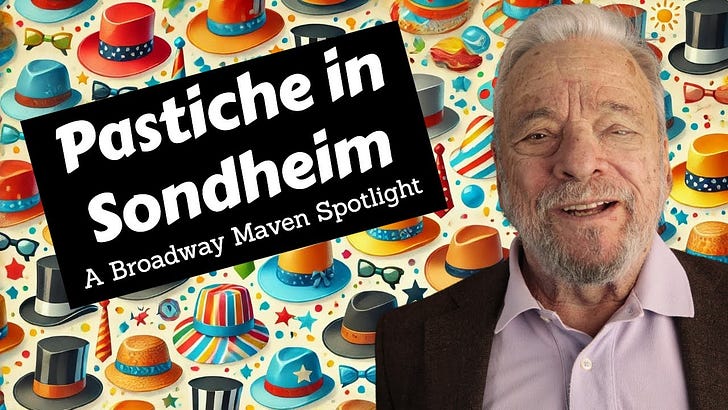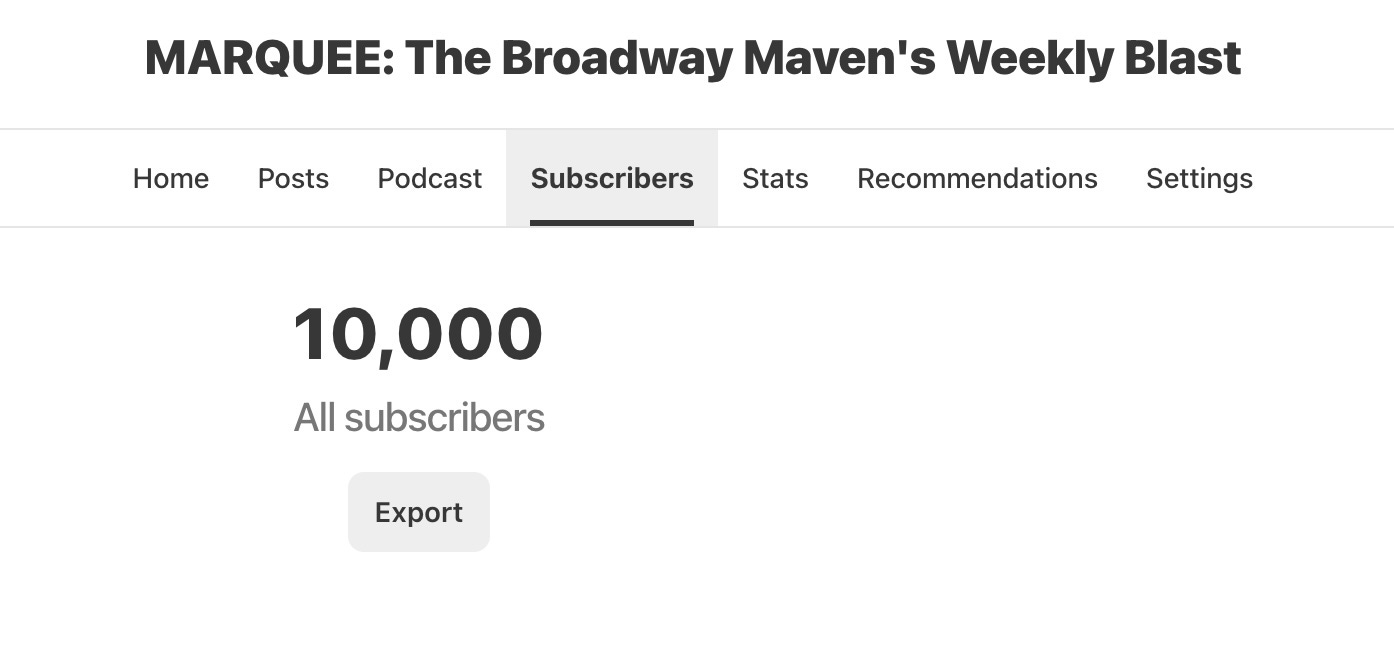Tipping the Hat: Pastiche in Sondheim (today's MARQUEE)
Five Sondheim songs that salute folk ballads, patter songs, early Broadway, and more
Shalom, Broadway lovers!
In today’s FREE edition of MARQUEE: The Broadway Maven’s Weekly Blast: a video essay that explains and provides examples of Stephen Sondheim’s use of the pastiche technique in song composition; a homework video for Monday’s class about Barbra Streisand’s musicals; and a Last Blast about Carousel.
Today, Premium subscribers also get: a student review of Forbidden Broadway: Merrily We Stole a Song; a Piano Talk about the Prologue from Ragtime; a Broadway Blast about Grease; and a quiz about Jewish Broadway moments.
VIDEO ESSAY: Stephen Sondheim was a master of pastiche, which is an artistic work that emulates another genre or artist in a respectful way (as opposed to a more mocking parody).
Want some examples? This video presents five Sondheim songs in the context of their musical styles, giving two examples of non-Sondheim songs for each, and listing multiple musical qualities they share. They are:
• "You Could Drive a Person Crazy" from Company (1940s female harmony groups);
• "The Ballad of Booth" from Assassins (folk ballads);
• "Broadway Baby" from Follies (early Broadway);
• "Agony" from Into the Woods (melodramatic ballads); and
• "Getting Married Today" from Company (patter songs).
Understanding pastiche unlocks the doors to so many Sondheim songs, in which the lyrics and tune were built around style of music he was paying homage to.
CONGRATULATIONS: Yesterday, MARQUEE marked a major milestone: 10,000 subscribers. Congratulations to Santiago S., the 10,000th subscriber, who will receive a lifetime Premium subscription to the newsletter. My humblest gratitude to all the subscribers who have helped sustain the publication over the last three and a half years.
Our Jewish Broadway course concludes with Barbra Streisand’s musicals on Monday, September 30 at Noon and 7 pm. It explores the iconic performer’s contributions to both stage and screen. Students will analyze her early Broadway role as Miss Marmelstein in I Can Get It for You Wholesale, as well as her performances in the stage and film versions of Funny Girl and the movies of Hello, Dolly! and Yentl. Focus will be placed on Streisand's vocal mastery, unique acting style, and her groundbreaking work as a female director in Yentl. Through lectures, clips, and discussions, students will gain a deeper understanding of how Streisand transformed musical theater and cinema, leaving an enduring legacy on the entertainment industry.
GET THE WORM (ANNOUNCEMENT): Don't get locked out! The Monday Noon ET meetings of the Broadway Maven's FREE classes over the last three weeks have completely filled up. There are only 100 spots per FREE session (Noon and 7 pm). If you wish to participate in any FREE class, please register early and definitely show up early. (Paid classes won’t turn people away.)
HOMEWORK: In preparation for Monday's class on Barbra Streisand musicals, ponder this question: Why do you think so few Jewish performers have reached diva status on Broadway? And what do you think makes Barbra Streisand so special that she's the only person to truly break the "matzah ceiling"? Put your answers in the comments below the video.
Note: Links to register for ALL classes are always available at TheBroadwayMaven.com.
• Monday, September 30 Noon and 7 pm ET Barbra Streisand’s musicals (FREE)
• Sunday, November 3, 10, and 17 Noon and 7 pm ET “The Music of Hamilton” with Mateo Chavez Lewis (FREE, registration opens October 1)
NOTE: As always, ALL-ACCESS Passholders do not have to sign up or pay for anything. Just show up!
LAST BLAST: When the policeman warns Julie Jordan about Billy Bigelow in Carousel, he says that in Bangor he was known for promising to marry girls and then taking her money. Julie claims she's not worried because she doesn't have any money, but there's another reason for her not to worry. Billy has already tried to take her money -- enough to buy his beer -- but at the last minute he gave it back to her and said he'd buy the beer himself. So Julie knows that Billy isn't as dangerous as he's been described. Of course, Billy really is dangerous, but not for taking her money. This moment foreshadows the deeper emotional and psychological dangers that Billy will pose to Julie, ultimately leading to the tragic consequences of their relationship.
Broadway Maven David Benkof helps students further their appreciation of musical theater through his classes, his YouTube channel, and MARQUEE: the Broadway Maven’s Weekly Blast. Contact him at DavidBenkof@gmail.com.







